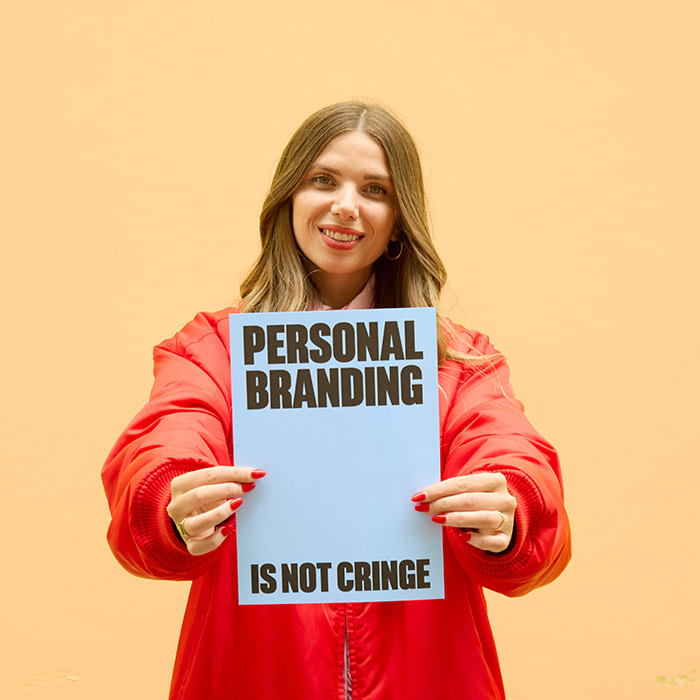The future of personal branding is internal
Stefanie Sword-Williams discusses the value of internal personal branding for business.

The idea of investing in your personal brand has been something many people only deemed to be important if you were a business owner or looking to set up something of your own. But now, we’re seeing personal branding take off across the globe. And it’s not just entrepreneurs who are interested, it’s employees who are eager to get involved and use their voice.
As a public speaker and training facilitator for global corporate businesses, “Building a personal brand in the workplace” has become one of my most requested speaking topics in the last year, and it’s one that companies should be leveraging if they want to see better business results.
When did personal branding lose the ick-factor?

Prior to the pandemic, personal branding was seen as a cringe-worthy activity that people would actively avoid and only embrace if they were looking for something new. But as we watched mass layoffs unfold, businesses closing down and job security rapidly fading away, the choice to invest in personal branding became less of a nice-to-have and more of an essential requirement if people wanted to stand out in a cluttered market.
In lockdown, almost everyone you knew started a podcast in their kitchen, launched the side hustle they always talked about, or started showing up online more frequently and more openly. Running a business that offers careers and confidence advice, my inbox quickly filled up with questions like; “How can I best show up in my career?” or “What else can I do to stand out in this market?”. And the answer to those people was personal brand. And although people invested in this out of fear at the time, it has now become a part of many people’s identity that they want to continue building.
What does good look like?
As a self-promotion expert, I am regularly sourcing and identifying brilliant references of how individuals promote themselves in person and online. Something I’ve noticed recently is just how many of my saved references have come from employees working at businesses.
Surreal, the cereal brand on a mission to shake up their industry, are not only celebrated for their B2C marketing tactics, they’re also generating positive attention for how creatively they are utilising their employees to promote their business. Most recently their Copywriter, John Thornton, shared a video of himself presenting a series of adverts that were not approved by his boss to go public, in a very comedic manner. The video is both refreshing and entertaining, but it gives us a better insight into their work culture, company values and relationships.
When I reshared this video on my social media, multiple followers replied saying it made them want to apply to the company, and I can completely see why. This video does a much more effective job than many of the corporate job listings we see online, and it’s because they chose to hero their talent, not just themselves.
In another example, Marketing Executive, Chloe Cara, who works at TikTok created a video that promoted a workshop she had given on behalf of the business. Along with seeing the great hotel she stayed at and her outfit checks, she also credited her boss for helping her reach these opportunities, gave us a sneak peek into the exclusive TikTok experiences, and promoted their services without it feeling like a sales ad.
What is clear about this content is the creative control that Chloe has been trusted with to share her own story. Her quirky editing style, distinctively unique voiceover and personal behind the scenes clips, created a vlog style format people can connect to. Not only has this been great to engage with people outside the business, Chloe has also shared that her frequent activity on LinkedIn has helped her connect with other people across the business who she might not have usually had the same exposure to. So you can add relationship building to the list of benefits personal brands at work can bring too.
And one final example to share is Jo Bird, TEDx speaker, Head of Creative at The Lounge, and someone who regularly shows up on my LinkedIn feed as a source of inspiration. Jo shares advice for confidence, tips on breaking into the industry, but most frequently she shares campaigns and marketing ideas from other brands that are often going viral.
I’ve never met Jo but when I think about creative women in my network who know their shit, I think of her, which in turn leads me to think about the company she works for. Jo’s consistency in posting has helped to raise her own visibility but also the awareness of the companies she works for.
Another great learning businesses can take from this example is that it doesn’t always need to be your own product or service being marketed. In fact, giving your employees the permission and encouragement to be a thought leader on platforms and talking about topical market trends is a great way to be present in industry conversations, even if it’s not your business in the spotlight.
My own experience of personal branding

I speak passionately about this topic, because I invested in my personal brand whilst I was still working full time and it was a brilliant way to grow my reputation both externally and internally. When colleagues discovered that I’d been hosting F*ck Being Humble events outside of work as a passion project, I was soon asked to support the company in launching our event series, where I got to develop my public speaking skills further. When people at work saw that I was posting articles on LinkedIn, I was soon asked if I wanted to contribute to the company blog and newsletter. And when they could see I was sharing interesting posts on Instagram, I was invited to support and grow the following on our business account. The businesses I worked for that could see my extra-curricular activities as a benefit were able to tap into these skills and use them to their advantage.
On reflection, I now know that investing in my personal brand was not about me trying to switch jobs or become more hireable in the future, it was about having a place to demonstrate my skills, interests and passions outside of my 9-5 job. It’s unrealistic to expect a full-time role to tick all your boxes, so having the opportunity to explore these outside of my daily responsibilities actually led to me feeling more engaged at work.
Now as a founder of my own business, my personal brand is integral to the company’s growth.
We don’t need to fear personal branding

For so long companies have been overlooking the power of employee personal branding as a business opportunity, but now is the time to lean into it. We need to move away from the strict PR guidelines and the traditional ‘top down’ approach where only the pre-approved senior members of staff can represent the company. Not only does it limit the reach businesses can have, but it also leaves the rest of your employees feeling like their voice is less important or untrusted to represent the company externally.
People want to hear from people, so if you are fortunate to have hired new or existing team members who want to invest in their personal brand whilst working at your company, don’t turn them away, turn them into ambassadors instead. There are endless benefits that can come from this including increased business awareness, employee retention, improved productivity, and it is highly likely to attract better talent in the long run. Instead of having one designated (and often small) team helping to build the profile of your company, you should be empowering your entire workforce too.
The future of personal branding is not just for aspiring entrepreneurs or freelancers, it’s for businesses that have the courage to empower their teams to use their voices publicly. With the right guidance and support this does not have to be a PR car crash, it could in fact be the thing that keeps your best talent, attracts more opportunities and builds a committed workforce who feel seen, heard and valued.
Don’t sleep on employee personal branding, embrace it.
Stefanie Sword-Williams is an award-winning founder, author and public speaker who was recently named as a Top 50 Workplace Leader. Her training and talks have reached people in over 50 countries and her book ‘F*ck Being Humble: Why Self-Promotion Isn’t A Dirty Word’ has sold over 10,000 copies.
Keep in touch
Get design inspiration, business tips and special offers straight to your inbox with our MOOsletter, out every two weeks.



